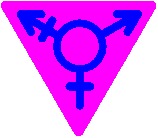
B.C. on Gender: My Letter to the Toronto Star
In December of last year, the Toronto Star's Michele Landsberg wrote a column about Kimberley Nixon's British Columbia Human Rights complaint. This is my letter to the editor of the Toronto Star.
December 23rd, 2000
Regarding the Kimberley Nixon Case
My friend, Diane, suggested that I write this letter. This is somewhat ironic, as I credit Diane with having the patience to educate me about feminism. She describes you as a feminist writer with whom she usually agrees, but urged me to write because she was furious with you because of your recent article regarding the BC Human Rights Commission and the Vancouver Rape Relief centre.
I'll let you know now, that I am a transgendered woman, and therefore cannot agree with what you wrote.
I know a lot of transactivists and I'm sure that, soon, they'll started mobilizing a letter-writing campaign to express how shocked and appalled they are at your article. I, myself, have never been completely satisfied with that type of response. One of the issues that continues to plague the trans community is lack of understanding, and I think that we are not better understood by such displays of anger. Instead, we are better understood through education. This letter, then, is my attempt to discuss in neutral, unemotional terms why I must disagree with you.
I have three points to make:
-
The notion of a gendered sense of self;
-
the portrayal of transwomen in Michele Landsberg's article; and
-
Kimberley Nixon's case.
Within the second paragraph of your article, your inability to empathize with people such as me is apparent. I am a transgendered woman, and you have described me as a "walking testament to the craziness of cultural rigidity". It is clear from the last line of your second paragraph that you view transgendered people as misguided gays and lesbians. That really makes it hard to have a meaningful conversation with you. Transphobia is, I suppose, a loaded word to describe such dismissiveness, but I can think of no other label.
As a transgendered woman, I wrestle, daily, with trying to come up with some way of explaining the nebulous concept of a gendered sense of self --that thing that many people call "gender identity". I know that I identify myself as a woman, and I always have. But beyond that, words fail me, because we don't really have much language to describe this sense of self. For the majority of the population, this sense of self is congruent with bodies and experiences, and they reused those words. But transgendered people know that there is something more. Something that is felt, inside. David Reimer, the famous John/Joan case, knew it too.
Ms. Landsberg, I am extremely disappointed at the heavy-handed put-downs you use to expel transpeople from the company of women. Like Margaret Wente before you, you rely on words like "mutilation" to tarnish transgendered surgeries as somehow "wrong". You create a false impression of most transwomen when talk of feather boas, and vamping. And I really think that your description of Kimberley Nixon's case using the iconography of rape is low. That's sensationalism. That's practically hate literature. Heck, it's the sort of thing we'd expect to see in the Toronto Sun.
Truth be told, if I were a friend of Kimberley Nixon's, I probably would have been inclined to advise her against taking her case to the BC Human Rights Commission. Make no mistake: I think that the Vancouver Rape Relief centre was wrong to exclude a woman because she happened to be transgendered. Such exclusion perpetuates trans oppression.
Nonetheless, I appreciate that an organization like the VRR must often put need above right and wrong. Women who have suffered sexual assault must receive support. Many of those women will be ignorant of trans issues, and an organization like VRR probably needs to build an environment where such women can be protected from any pain that impedes their support -- even pain that is based in ignorance. I suppose that the pragmatic part of me agrees with Lee Lakeman; greatest good for the greatest number, and all that. But trans women will always be outnumbered, won't we?
Let's face it, if women are treated as second class citizens in this world, then trans people are third class. Actually, third class is probably being generous. Trans women lose jobs and families, are the victims of bashing and ridicule, and are excluded from any number of communities. And the emotional consequences of that are enormous. Remember when you spoke of shame and omnipresent threats as defining moments? You, Michele Landsberg, are helping to foment that.
Kimberley Nixon's case was a necessary case, although I wish that many, many, many other battles had come first. Some women's communities have bent over backwards to help us; others have gone out of their way to hurt us. I'm saddened that you found it necessary to be in the latter group.
Copyright © 2000 by B.C. Holmes. Last
updated December 23rd, 2000.
Transgender logo Copyright © by Nancy Reynolds Nangeroni, Ninja Design.
Back to my article about thirdness